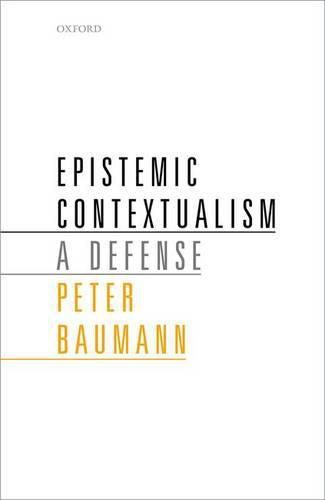Readings Newsletter
Become a Readings Member to make your shopping experience even easier.
Sign in or sign up for free!
You’re not far away from qualifying for FREE standard shipping within Australia
You’ve qualified for FREE standard shipping within Australia
The cart is loading…






Peter Baumann develops and defends a distinctive version of epistemic contextualism, the view that the truth conditions or the meaning of knowledge attributions of the form S knows that p can vary with the context of the attributor. The first part of the book examines arguments for contextualism and develops Baumann’s version. The first chapter deals with the argument from cases and ordinary usage; the following two chapters address theoretical arguments, from reliability and from luck. The second part of the book discusses the problems contextualism faces, to which it must respond, and provides an extension of contextualism beyond epistemology. Chapter 4 discusses lottery-scepticism and argues for a contextualist response. Chapter 5 is dedicated to a homemade problem for contextualism: a threat of inconsistency. Baumann argues for a way out and for a version of contextualism that can underwrite this solution. Chapter 6 proposes a contextualist account of responsibility: The concept of knowledge is not the only one which allows for a contextualist analysis and it is important to explore structural analogies in other areas of philosophy. The third part of the book is focused on some major objections to contextualism and alternative views, namely subject-sensitive invariantism, contrastivism and relativism.
$9.00 standard shipping within Australia
FREE standard shipping within Australia for orders over $100.00
Express & International shipping calculated at checkout
Peter Baumann develops and defends a distinctive version of epistemic contextualism, the view that the truth conditions or the meaning of knowledge attributions of the form S knows that p can vary with the context of the attributor. The first part of the book examines arguments for contextualism and develops Baumann’s version. The first chapter deals with the argument from cases and ordinary usage; the following two chapters address theoretical arguments, from reliability and from luck. The second part of the book discusses the problems contextualism faces, to which it must respond, and provides an extension of contextualism beyond epistemology. Chapter 4 discusses lottery-scepticism and argues for a contextualist response. Chapter 5 is dedicated to a homemade problem for contextualism: a threat of inconsistency. Baumann argues for a way out and for a version of contextualism that can underwrite this solution. Chapter 6 proposes a contextualist account of responsibility: The concept of knowledge is not the only one which allows for a contextualist analysis and it is important to explore structural analogies in other areas of philosophy. The third part of the book is focused on some major objections to contextualism and alternative views, namely subject-sensitive invariantism, contrastivism and relativism.